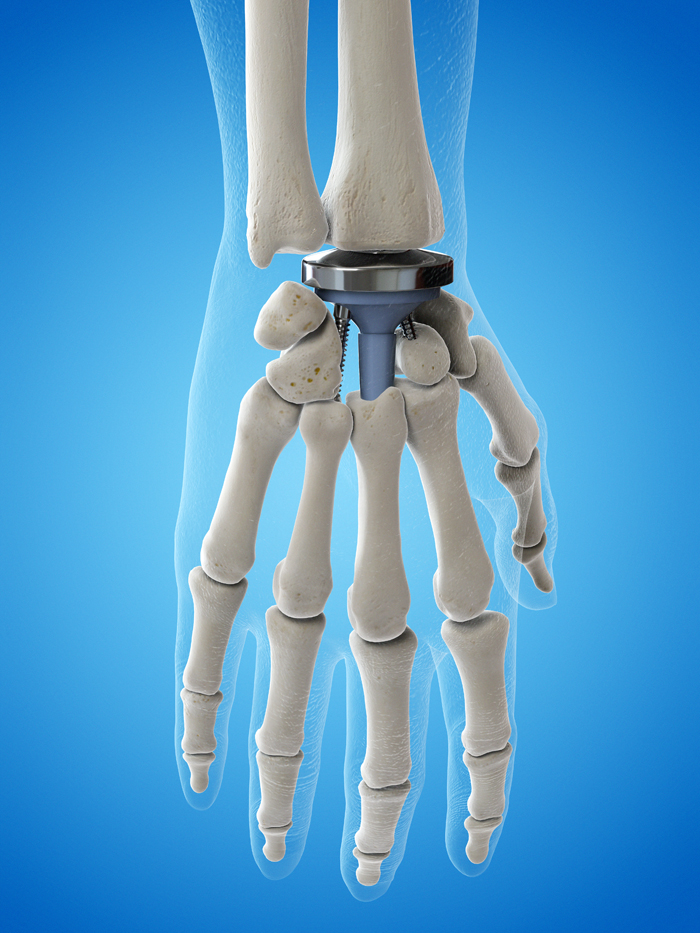Wrist Replacement Surgery in Karol Bagh, Delhi
Wrist replacement surgery is also known as wrist arthroplasty. It is the surgical procedure for replacing an injured joint with an artificial implant. These implants are safe to use and give maximum relief. You can visit an arthroscopy surgeon near you for proper treatment.
What is wrist replacement surgery?
Wrist replacement surgery is an outpatient procedure. The surgery is often combined with other surgeries to correct different types of deformities in the hands, fingers, etc.
During a wrist replacement surgery, an incision is made on the back of the hand. The damaged wrist bones and the lower arm bones are removed. The remaining bones are prepared and shaped for new joint implants. The implants are made up of plastic (polyethylene) and metal.
An implant has two parts:
Distal component - it is a globe-shaped metal that is attached by two metal stems. These stems fit inside the radius of the hollow marrow cavity of the metacarpal and carpal. The ellipsoidal head gives a natural look and allows movement of the wrist.
Radial component - it is made up of a flat piece of metal and a plastic cup. The flat metal piece attaches to the canal of the radial bone and the plastic cup fits in the metal. It forms a socket-like structure for the wrist joint.

Who qualifies for a wrist replacement surgery?
Wrist replacement surgery is conducted for patients who have extreme cases of arthritis. Some of the symptoms are:
- Swelling in wrist
- Stiffness in joints
- Inability to move and reduced range of motion
- Clicking and grinding sounds from the wrist joints
- Extreme pain in movement
- Poor grip
- Weak strength in wrists and fingers
The common indications of wrist replacement surgery are:
- Rheumatoid arthritis
- Kienbock disease
- Post-traumatic arthritis
- Failed wrist-fusion surgery
Before the surgery, a physician conducts a pre-operative evaluation of the body. Make sure that you discontinue medicines that are blood thinning, immune-modulating, etc.
Why is wrist replacement surgery conducted?
Wrist joint replacement surgery is used to treat major wrist joint injuries, infections and deformities. The cartilage of the wrists are damaged and the bones rub against each other. This leads to wear and tear and further injury in the wrist joints.
Rheumatoid arthritis is a chronic condition that affects the right and left joints of the wrist. It results in stiffness and pain around the wrists.
In osteoarthritis, the cartilage of the bones undergoes wear and tear gradually with time. Wrist infection can lead to septic arthritis.
The main reason behind this surgery is to relieve pain, ease discomfort and allow mobility of hands.
What are the benefits?
- Proper hand and wrist Movement
- Less pain
- Increased mobility
- Reduced swelling
What are the risks?
- Infection near the operated area
- Instability in the wrist
- Failure of implants
- Periprosthetic fractures
- Damage in the nerves
- Wrist dislocation
- Risks related to anesthesia
- Ligament injury
When do you need to visit a doctor?
You must need to be in touch with a doctor after the surgery. The wrist joint replacement surgery usually ensures positive outcomes, but sometimes there can be minor complications after the procedure.
You can request an appointment at the Apollo Spectra Hospital, Karol Bagh, New Delhi.
You can book an appointment by calling 011-4004-3300.
Conclusion
Wrist replacement surgery is suggested for cases of extreme arthritis and infection. You must follow your doctor's advice for quick healing.
You must follow the following precautions to get the maximum benefit out of the surgery:
- Take regular medicines
- Avoid lifting heavy objects
- Avoid impact loading
- Try simple wrist exercises
- Avoid excessive movement of hands
- Follow a proper diet and incorporate other lifestyle changes
Surgery is usually considered to be the last option after medicines and other treatments fail. If you’re not comfortable with the surgery, you can discuss it with your doctor and try to find other suitable ways of treatment.
After completing the surgery, if there are no complications, you can go home on the same day. The surgery is usually done on an outpatient basis.
Symptoms
Our Top Specialities
NOTICE BOARD
CONTACT US
CONTACT US
 Book Appointment
Book Appointment


.svg)
.svg)
.svg)
.svg)








